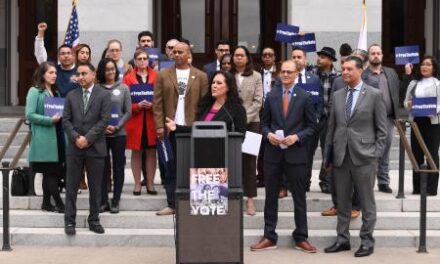
By SDCN Editor
Washington, D.C.–The U.S. Equal Employment Opportunity Commission (EEOC) today issued a Notice of Proposed Rulemaking (NPRM) to implement the Pregnant Workers Fairness Act (PWFA).
The NPRM was posted by the Federal Register for public inspection and will be published for public comment in the Federal Register on Aug. 11. Members of the public wishing to comment on the NPRM will have 60 days from the date of publication to do so through www.regulations.gov.
“The PWFA is a step forward for workers, families, and the economy. This important new civil rights law promotes the economic security and health of pregnant and postpartum workers by providing them with access to support on the job to keep working, which helps employers retain critical talent,” said EEOC Chair Charlotte A. Burrows. “The EEOC’s bipartisan proposed regulation furthers the agency’s leadership role in fulfilling the promise of the PWFA’s protections. We encourage the public to provide meaningful feedback about how the proposal would impact workplaces and ways to assist employers and workers in understanding the law.”
The PWFA requires covered employers to provide reasonable accommodations to a worker’s known limitations related to pregnancy, childbirth, or related medical conditions unless the accommodation will cause the employer undue hardship. This law builds upon existing protections against pregnancy discrimination under Title VII of the Civil Rights Act and access to reasonable accommodations under the Americans with Disabilities Act.
The NPRM was approved by a majority vote of the Commission on Aug. 1. The NPRM explains how the EEOC proposes to interpret the PWFA and certain terms in the statute, such as “temporary”, “essential functions”, and “communicated to the employer.” It also provides numerous examples of possible reasonable accommodations and seeks input on whether there should be more examples and for what additional different situations. In addition, the EEOC solicits information and comments on particular issues, including existing data quantifying the proportion of pregnant workers who need workplace accommodations, and existing data on the average cost of pregnancy-related accommodations.
“The EEOC’s bipartisan proposed regulation helps to bring the promise of this transformative law to life, enabling pregnant and postpartum workers to retain their jobs while maintaining a healthy pregnancy and recovering from childbirth,” said Vice Chair Jocelyn Samuels. “The regulation provides concrete, real-world examples that help workers understand their rights and help employers comply with the new law and reap the benefit of retaining skilled employees.”
“As an advocate for the passage of the PWFA itself, I am proud to have collaborated with my fellow Commissioners to propose a bipartisan rule to help implement this important law,” said Commissioner Andrea Lucas. “I look forward to the EEOC’s continued work ahead to make the PWFA’s promise a reality for women and families nationwide.”
The PWFA is bipartisan legislation that was signed into law by President Biden on Dec. 29, 2022. The EEOC enforces the PWFA and began accepting charges on June 27, the day the law became effective. The PWFA requires the EEOC to issue regulations to implement the law by Dec. 29.
The EEOC previously has released educational resources including a set of resources on the PWFA, called “What You Should Know About the Pregnant Workers Fairness Act,” including a webinar for employers, an informational poster for healthcare facilities, tips for workers to request accommodations, a short video series, and a revised “Know Your Rights” poster required to be posted in most workplaces.
The EEOC will continue to update “What You Should Know about the Pregnant Workers Fairness Act” as more information is available.
More information is available at www.eeoc.gov.




